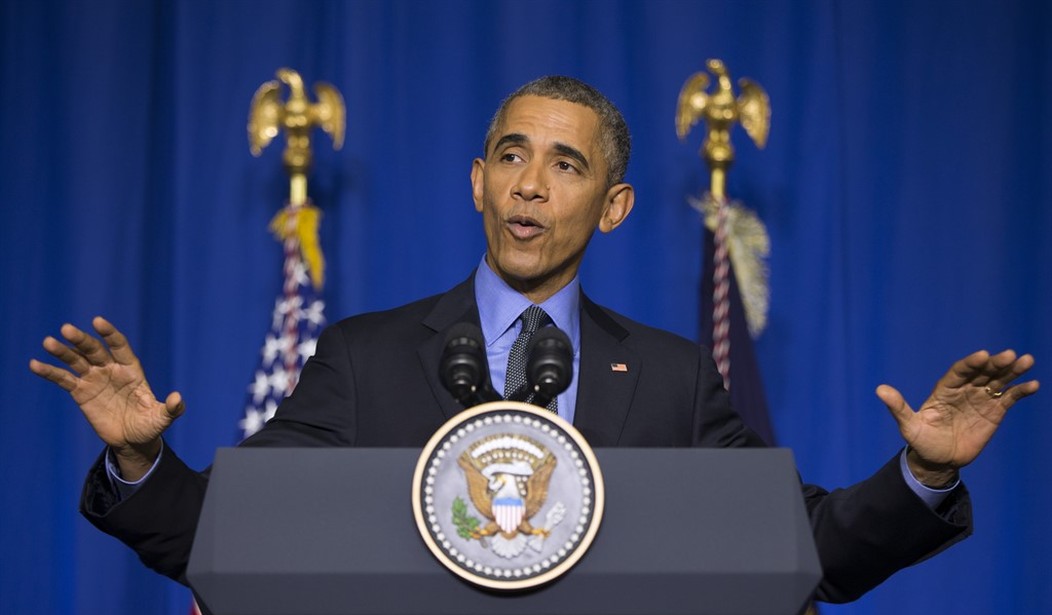President Barack Obama has expressed an apocalyptic vision he suggests other reasonable people must embrace.
On Monday, in Paris, he said he foresees: "Submerged countries. Abandoned cities. Fields that no longer grow."
And also: "Political disruptions that trigger new conflict, and even more floods of desperate peoples seeking the sanctuary of nations not their own."
Climate change, he argues, threatens to cause these problems. Therefore, at the international climate change conference, he repeated his call for an international agreement that seeks to curb global carbon emissions from human activities.
"So I just want to repeat so that everybody understands what we will consider success several weeks from now," Obama said at a Tuesday press conference. "Number one, that it is an ambitious target that seeks a low-carbon global economy over the course of this century."
He then admitted that even what he views as "an ambitious target" will not prevent catastrophes. What it will do is build "the architecture" for further controls.
"And if we hit those targets, then we will have been successful," Obama said. "Not because, by the way, the pledges alone will meet the necessary targets for us to prevent catastrophic climate change, but because we will have built the architecture that's needed.
"We will have established a global consensus of how we're going to approach this problem," he said. "And then we can successfully turn up the dials as new sources of energy become available, as the unit costs for something like solar or improvements in battery technology make it easier for us to meet even higher targets. And, systematically, we can drive down carbon emissions and the pace of climate change over the course of several decades."
Recommended
The National Climate Assessment that the Obama administration released last year argued that greenhouse gas emissions cause climate change, that carbon dioxide makes up the vast majority of the greenhouse gas produced in the United States, and that transportation and electricity production are America's worst offenders in producing this gas.
"Human-caused climate change results mainly from the increasing atmospheric concentrations of greenhouse gases," said the assessment.
"Carbon dioxide made up 84 percent of U.S. greenhouse gas emissions in 2011," it said. "Forty-one percent of these emissions were attributable to liquid fuels (petroleum), followed closely by solid fuels (principally coal in electric generation), and to a lesser extent by natural gas. The two dominant production sectors responsible for these emissions are electric power generation (coal and gas) and transportation (petroleum)."
If you accept this argument, the problem is: All those Americans driving around freely in privately owned cars and trucks and living and working in warm, well-lit places.
Were the entire world to someday achieve the freedom of movement, the winter-time warmth and the summer-time air-conditioning that Americans -- with their free economy and industrious spirit -- have enjoyed for many decades now, what would that mean for global carbon emissions?
John P. Holdren, the director of the White House Office of Science and Technology Policy, was one of two administration officials who signed the letter transmitting the administration's National Climate Assessment to Congress.
Back in 1973, Holdren joined with Paul and Anne Ehrlich (authors of "The Population Bomb") to co-author "Human Ecology: Problems and Solutions." In that book, Obama's future science adviser argued for "de-development" of the United States and global redistribution of wealth.
"What is actually needed is nothing less than a transformation of human society," Holdren and his co-authors wrote. "For, if these programs can have any chance of success, mankind will finally have to start treating the entire globe as a single entity and all human problems as part of the same complex fabric."
"Some degree of sovereignty will have to be sacrificed if rational control over the planet's resources and the maintenance of the quality of the oceans and atmosphere are to be achieved," Holdren and the Ehrlichs said then.
In 1995, as this column has noted before, Holdren joined again with Paul Ehrlich (and Gretchen Daily of the Center for Conservation Biology at Stanford) to argue for a world of zero growth.
"Many of the practices inadequately supporting today's population of 5.5 billion people are unsustainable," Holdren and his co-authors wrote in an essay published by the World Bank.
"This is enough," they said, "to say quite a lot about what needs to be faced up to eventually (a world of zero net physical growth), what should be done now (change unsustainable practices, reduce excessive material consumption, slow down population growth), and what the penalty will be for postponing attention to population limitation (lower well-being per person)."
In Paris, Obama did not argue for de-developing the United States or a world of zero net physical growth. But he did argue for organizing the world around climate change.
"Part of what I've been trying to describe during the course of my presidency is that where we make the most impact -- and where, by the way, we strengthen our relationships and influence the most -- is when we are helping to organize the world around a particular problem."
This, Obama believes, is what his administration did "during the Ebola response" and in "making sure that Iran didn't get a nuclear weapon."
Now, he says: "The same is true with climate change."

























Join the conversation as a VIP Member